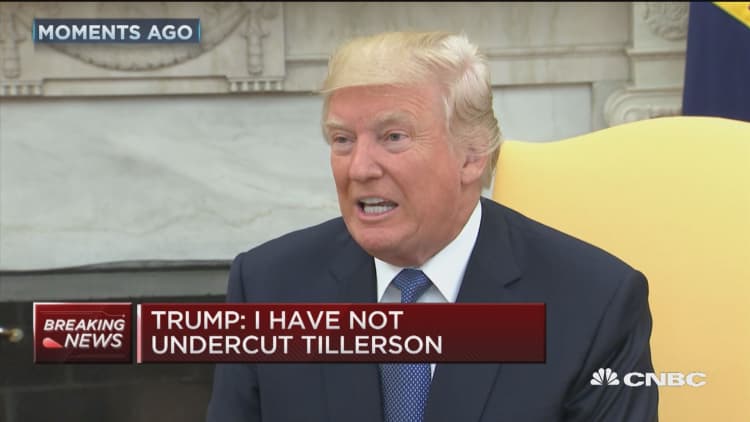Threats by President Donald Trump to ax crucial payments to health insurers will double, on average, the price of most Obamacare plans in California next year.
Obamacare officials in the Golden State on Wednesday said they are slapping a 12.4 percent surcharge on the prices of so-called silver individual health plans in 2018 because of uncertainty over whether Trump will continue making those payments.
And it will be taxpayers, not the insurance customers themselves, who will end up footing much of the bill.
Without the surcharge, silver plans sold on Covered California, the state's Obamacare marketplace, would have risen an average of just 12.5 percent next year, officials said as they revealed overall prices statewide.
With the surcharge, the average price hike is just shy of 25 percent.
For individual insurers, the actual added surcharge per plan will be anywhere from 8 percent to 27 percent.
About 6 out of 10 customers of Covered California are enrolled in silver plans, which cover 70 percent of enrollees' health costs.
Covered California said that even with the surcharge, 78 percent of customers who qualify for federal subsidies to reduce their monthly premiums will "either see no change in what they would pay for insurance in 2018, or would pay less than what they would have paid if there had been no ... surcharge."
That is because the value of those premium subsidies, which are in the form of federal tax credits, rises with the retail price of the health plan. In "many" cases, Covered California said, subsidized silver plan customers will see their subsidies rise more than the amount of the surcharge.

Covered California said that customers who earn too much to qualify for premium subsidies will be exempt from the surcharge if they buy their silver plan directly from an insurer, instead of from the exchange.
Or those customers can also avoid the surcharge by switching to a plan in a different "metal" tier, such as bronze, gold or platinum. No surcharge was imposed on those other tiers' plans.
Only about 65,000 people buy silver plans from Covered California without the help of subsidies.
Bronze plans, which have the lowest monthly premiums as a rule, cover 60 percent of customers' health costs, while pricier gold plans cover 80 percent of customers' health costs, and the most expensive platinum plans cover 90 percent of such costs. As a rule, the less expensive the plan, the higher the out-of-pocket costs for customers, and vice versa.
The surcharge reflects uncertainty about whether the federal government will continue paying insurers billions of dollars in what are known as cost-sharing reimbursements, or CSRs.
The payments compensate health insurers for discounts in out-of-pocket health charges they must offer millions of low-income Obamacare customers, by law. The discounts are available only to customers of silver plans.
If the CSR payments stop, insurers nationwide would be forced to continue giving the discounts to customers without any revenue to offset those costs. California's silver plan surcharge provides insurers in that state with a financial cushion to absorb that potential loss of money.
"Covered California worked hard to come up with a plan that ensures a stable market and protects as many consumers as possible from an unnecessary price hike," said Peter Lee, executive director of that marketplace.
"While some consumers will face higher costs than expected this year unrelated to the CSR surcharge, they can still shop for a better deal to reduce the impact of their surcharge."
Under the Affordable Care Act, insurers must offer lower-income Obamacare customers reduced charges for copayments, deductibles, coinsurance and other out-of-pocket health costs. But the federal government is supposed to reimburse insurers for that lost revenue in the form of CSRs.
While the government has continued to do so, Trump, an Obamacare foe, has threatened to end the payments.
And the Republican-led Congress has not guaranteed they will continue being paid after the House of Representatives won a court case that successfully challenged the Obama administration's decision to make the payments without congressional approval.
Brad Woodhouse, director of the Obamacare advocacy group Protect Our Care Campaign, said that while Trump and GOP congressional leaders "have been unable to repeal the health-care law, they have been doing everything they can to sabotage the marketplace."
"Everyone with the benchmark [silver] plan who gets a bill from their insurer for higher health care costs next year can thank President Trump and Republicans in Congress for the sabotage that led to this," Woodhouse said.
"Their repeated threats, uncertainty and sabotage of our health care system is taking a toll on real people's lives in California. Your health-care bills next year should say 'brought to you by Donald Trump.' "
WATCH: Trump tells health chief to deny Iowa's Obamacare waiver



